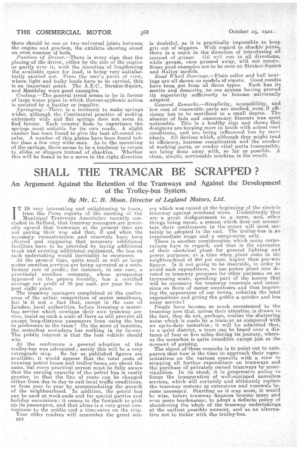SHALL THE TRAMCAR BE SCRAPPED?
Page 10

If you've noticed an error in this article please click here to report it so we can fix it.
An Argument Against the Retention of the Tramways and Against the Development of the Trolley-bus System.
By Mr. C. B. Moon, Director of Leyland Motors, Ltd.
IT IS very interesting and enlightening to learn, from the Press reports of the meeting of the Municipal Tramways Association recently concluded in Salford, that tramway managers are generally agreed that tramways at the present time are not paying their way and that, if and when the necessary reconstruction and renewals have been effected and supposing that necessary additional facilities have to be provided by laying additional track and erecting additional equipment, the loss on such undertaking would inevitably be enormous.
At the present time, quite small as well as large motor omnibus services are being operated at a satisfactory rate of profit ; for instance, in one case, a provincial omnibus company, whose prospectus appeared in the papers recently, has a certified average net profit of 35 per cent, per year for the past eight years. The tramway managers complained at the conference of the unfair competition of motor omnibuses, but is it not a fact that, except in the case of London, local authorities, before licensing a motorbus service which overlaps their own tramway service, insist on such a scale of fares as will prevent all except long-distance passengers from using the bus in preference to the tram .7 On the score of taxation, the motorbus nowadays has nothing in its favour. The public) interest is that the best vehicle should win.
At the conference a general adoption of the trolley-bus was advocated ; surely this will be a very
retrograde step. So far as published figures are available, it would appear that the, total costs of running petrol buses and trolley-buses are about the same, but every practical person must be fully aware that the earning capacity of the petrol bus is vastly greater, in that the line of route can he changed either, from day to day to suit local traffic conditions, or from year to year by accommodating the growth of the neighbourhood. In addition, the petrol bus can be used at week-ends and for special parties and holiday excursions ; it comes to the footpath to pick up its passengers, and that alone is a very great convenience to the public and a time-saver on the trip.
Your older readers will remember the great out n14
cry which was raised. at the beginning of the electric tramway against overhead wires. Undoubtedly they are a great disfigurement to a town, and, other things being equal, a system which does not necessitate their continuance in the,street will most certainly be adopted in the end. The trolley-bus is an intermediate stage and a compromise only.
There is another consideration which many corporations have to regard, and that is the extension of their electrical plant for general lighting and power purposes,at a time when plant costs in the neighbourhood of 250 per cent. higher than prewar figures. Is it not going to be desirable, in order to avoid such expenditure, to use power plant now devoted to tramway purposes for other purposes on an increasing scale, spending part of the money that will be necessary for tramway renewals and extensions on fleets of motor omnibuses and thus improving the appearance of our towns, reducing the total expenditure and giving the public a quicker and less noisy service'? People have become so much accustomed to the tramway now that, unless their attention is drawn to the fact, they do not, perhaps, realize the shattering noise which is made by a tramcar as compared with an up-to-date motorbus; it will be admitted that, in a quiet district, a tram can be heard over a distance of four or five miles during its journey, whereas the motorbus is quite inaudible except just at the moment of passing.
The object of these remarks is to point out to ratepayers that now is the time to approach their representatives on the various councils with a view to stopping all further expenditure on tramways and the purchase of privately owned tramways by municipalities. In its stead, it is progressive policy to foster the inauguration of well-equipped motorbus services, which will certainly and ultimately replace the tramway systems as extensions and renewals he come necessary. Startling as it may seem, it would be wise, before tramway finances become more and even more burdensome, to adopt a definite policy of abandoning the whole of the tramwayundertakings at the earliest possible moment, and as an alternative not to tinker with the trolley-bus.






























